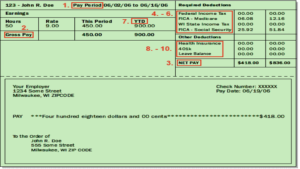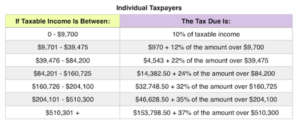
May 1, 2019 | Uncategorized
This should have been the first post, but it will likely not draw much traffic, so it is not the first post. When I received my first paycheck in college, I was so disappointed by how little I was making. I had worked for TEN HOURS! But the paycheck was so small. Who was this other person taking my money?

So little money
I was away from home and very new in America. I had no one to explain my first pay stub to be me. I am sure many of you have had this same confusion. In this very short post, I attempt to break down the pay stub. This will help make other things clearer as we move forward. Please forgive me – I am a teacher and tend to over-explain. Ignore what is not helpful. (But students do not ignore me in class- everything I say is IMPORTANT! LOL)
First job – yay
How much do I make? Whenever you signed your contract there was a number on there. The figure is likely what made you choose that job over others. Chipo has landed her first job after college and she will be making $60 000 a year. Chipo will likely divide that amount by 12 to get a ballpark monthly salary
$60 000/12 = $5 000
Chipo will be very happy with this number. She will assume that all her expenses will be met but she is WRONG.
What does a paycheck look like?

This is for the benefit of Generation Z who have probably never seen a physical paycheck. I also know that some of my millennial friends in Zimbabwe have never had a job and therefore they have never seen a paycheck either.
The image above is from the igrad their page has a lot of good financial resources.
- Pay period –
- this is the work period that you are being paid for. If you make an hourly wage you want to make sure that the dates are accurate. I make a fixed salary now, so I do not pay much attention to this.
- This is also important because some employers send out paychecks bi-weekly instead of monthly. You will need to know this to plan your savings strategy or for setting up your bill pay dates
2. Earnings
- Hourly rate – if you get paid hourly like John Doe here you will need to confirm that your hours have been inputted correctly.
- Over time – if you work more than 40 hours for 50-hour weeks then the additional 10 hours for that week will be paid at a higher rate of 1.5 your hourly rate.
- Gross pay
- This is your full earnings BEFORE any deductions in the example earlier this would be what Chipo calculated to be $5000 or $450 for John Doe
- Net Pay
- This is what you get to take home after the deductions
What is taken out before you get your actual paycheck

Required Deductions: Federal Tax, State Tax, Local Tax, FM TAX
You CAN not opt out of these deductions. Everyone has to pay for them. These are the monies that keep a country running and this also the reason that you should vote or engage in politics. From these standard deductions, your local and federal government pays employees, fixes roads, provides health care (or not) and education. The government can also loot and by themselves fancy cars at your expense. The explanation below is based on a U.S. system, but every country has something similar.
1. Federal Tax:
What you pay to the federal gov. There are seven federal tax brackets: 10%, 12%, 22%, 24%, 32%, 35% and 37%. The bracket depends on taxable income and filing status, whether you are filling as a single person or as a married couple filing jointly. I am in the 21% tax bracket which hurts me inside a little.

2. State Tax
This varies from state to state. The 2019 tax rate for Massachusetts is 5.1 %. Just google your state and tax rate to find out your rate.
3. Local Tax:
This is rare but some localities have yet another tax. You may want to check this before you choose your next job- usually, it is not much.
4. FICA TAX
This is the federal Insurance Contributions Act, this is money taken out of your paycheck to fund programs like social security and Medicare. You really must pay attention to politics
5. MEDICARE-
There is a 1.45% tax on gross income for everyone to cover Medicare which goes towards health care for the elderly and disabled.
5. Social Security
This is the gov mandated retirement program. Everyone must pay in 6.25% of their gross income into the program. I just learned that you can check your social security benefits online. How many social security credits you have towards retirement or disability and benefits to your family in the event of death (so sad to think about). If you have been working in the US and paying social security then you have some benefits already. You need just 40 social security credits to benefit from the program. In 2019, you receive one credit for each $1,360 of earnings, up to the maximum of four credits per year. Generally, you need to have worked about 10 years to get social security benefits. It is a good idea to regularly log into your social security account online to check your benefits
The UK system is amazing -I just learned that after 65 everyone gets a nice pension. I am sure there are plenty of issues there too. South Africa may have something similar.
Voluntary-ish PRE-TAX DEDUCTIONS
Other deductions! I know it feels like it never ends – but the next set of deductions are a little more fun. They reduce your tax bill which is a nice bonus
- EMPLOYER-SPONSORED RETIREMENT 401/403 etc
More on this later – most companies offer various retirement options. Some offer a safe harbor contribution where you do not need to add anything in to get something. I just spoke to a friend who works for a university that REQUIRES all full-time people to put in 5% and they put in 9%. My university is wonderful. They will put in 9% whether or not I put in anything. They will also match up to 3% of my contributions which is great so each paycheck I have 15% going towards retirement which is really good.
2. MEDICAL FSA
This is a flexible spending health care plan. For example, this last year I set aside $500 for any co-pays (what you pay at the doctor’s office), I also use it for acupuncture (some policies allow), herbal tea, birth control (including condoms – seriously save tax on condoms). There is a lot you can do with it and in some cases, it rolls over. I also bought some sweet eyeglasses. Do you like my glasses? I need at least 2 pairs because every morning it is Tom and Jerry to find them.
3. HEALTH INSURANCE
Since Obamacare passed health insurance is now mandatory. Your employer puts in a portion and you do the same. More on this later but worth to mention that my husband and I found it cheaper to be on separate plans. I pay $118/month for my semi-comprehensive and my employer pays in $400. It is expensive but as I explained earlier it is worth it.
SOME ACRONYMS AND KEYWORDS
SM- MEDICARE
SS- SOCIAL SECURITY
FM – FEDERAL (M for Married and S for Single)
MA- Massachusetts for me so your State for you
DISCLAIMER: MoneyProfessor is my personal blog. I provide general information – not professional or financial advice. Opinions and representations on are my own. I am not providing financial advice or legal advice on my blog. I am only providing general information. You should consult a professional before making any financial or legal decisions.
Mar 22, 2018 | Uncategorized
Flake, Coons Outline Framework for U.S. – Zimbabwe Relations
Posted on Mar 22 2018
WASHINGTON – U.S. Sens. Jeff Flake (R-Ariz.) and Chris Coons (D-Del.), both members of the Senate Foreign Relations Committee, today introduced a bill to lay the framework for U.S. relations with the new government in Zimbabwe. This legislation updates the Zimbabwe Democracy and Economic Recovery Act of 2001 and sets forth the steps Zimbabwe needs to take to have sanctions on its country lifted.
“President Mnangagwa has signaled his intent to bring about change in Zimbabwe. His words need to be followed by concrete actions,” said Flake. “This measure outlines steps that, if taken, would go a long way to demonstrate that President Mnangagwa is earnest in his desire to bring about long-overdue change for the people of Zimbabwe, who suffered under authoritarian rule for far too long.”
“After 37 years of suffering under the repressive rule of Robert Mugabe, the people of Zimbabwe should be excited about the possibility of a brighter future. To ensure conditions throughout the country improve, the international community should insist on concrete actions from the new government of Zimbabwe before lifting sanctions and renewing investment in the country. This bill is intended to outline the U.S. Senate’s expectations of the steps President Mnangagwa and other leaders should take,” said Coons. “We look forward to visiting Zimbabwe, meeting with its top officials, and assessing the steps they are taking to hold free, fair, and credible elections as well as to advance broader economic and political reforms to improve the lives of all the citizens of Zimbabwe.”
To view a PDF of the bill, click here.
Summary of the Bill and conditions for lifting sanctions:
‘‘(2) PRE-ELECTION CONDITIONS. —The following pre-election conditions are met:
‘‘(A) Establishment and public release, without cost, in both paper and digital formats, of a biometric voter registration roll that is endorsed by all registered political parties.
‘‘(B) An independent electoral management body is selected, the members of which should be nominated by all political parties represented in the parliament of Zimbabwe, and permitted to entirely carry out the functions as- signed to it in section 239 of Zimbabwe’s 2013 constitution in an entirely independent manner.
‘‘(C) The Defense Forces of Zimbabwe are neither permitted to actively participate in campaigning for any candidate nor to intimidate voters, and must verifiably and credibly uphold their constitutionally mandated duty to respect the fundamental rights and freedoms of all per- sons and be non-partisan in character.
‘‘(D) International observers, including from the United States, the African Union, the Southern African Development Community, and the European Union are permitted to observe the entire electoral process, both prior to, on, and following voting day, including by monitoring polling stations and counting centers, and are able to independently operate in a manner enabling them to access and analyze vote tallying, tabulation, and the transmission and content of voting results.
(E) Candidates are allowed free and full access to state media, which must afford equal time and coverage to all registered parties, in an impartial manner, and must be able to campaign in an environment that is free from intimidation and violence.
‘‘(F) Civil society organizations must freely and independently be able to carry out voter and civic education, and to monitor the entire electoral process, including by observing, recording, and transmitting public-posted or announced voting results, including at the ward, constituency, and all higher levels of the vote tallying process, including through the conduct of one or more parallel vote tabulation exercises.’’;
(2) by redesignating paragraphs (3) and (5) as paragraphs (7) and (8), respectively;(3) by striking paragraph (4); (4) by inserting after paragraph (2) the following new paragraphs:
‘‘(3) PRESIDENTIAL ELECTION. —Zimbabwe has held an election that is widely accepted as free, fair, and credible by independent international and domestic civil society monitors, and the president-elect is free to assume the duties of the office.
(4) UPDATING STATUTES. —Laws enacted prior to passage of Zimbabwe’s new Constitution in March 2013 that are inconsistent with the new Constitution are amended or repealed so that they are consistent with the Constitution.
‘‘(5) UPHOLDING THE CONSTITUTION. —The Secretary of State has certified that all elements of the Constitution, including devolution, are being implemented.
‘‘(6) ECONOMIC REFORMS. —The Government of Zimbabwe has demonstrated a sustained commitment to reforming Zimbabwe’s economy in ways that
will promote economic growth, address unemploy- ment and underdevelopment, and restore livelihoods. ‘‘(7) DIAMOND REVENUES.—The Secretary of State has certified that a transparent and credible accounting for all diamond revenues since 2000 has
taken place.’’; and
(5) in paragraph (7), as redesignated by para-
graph (2) of this subsection, by striking ‘‘consistent with’’ and all that follows through ‘‘September 1998’’.
SEC. 7. REMOVAL OF AUTHORITY TO PAY LAND ACQUISI- TION COSTS.
Section 5(a)(2) of the Zimbabwe Democracy and Economic Recovery Act of 2001 is amended by striking ‘‘, including the payment of costs’’ and all that follows through ‘‘thereto’’.
SEC. 8. INCLUSION OF AUSTRALIA IN CONSULTATIONS
ABOUT ZIMBABWE.
Section 6 of the Zimbabwe Democracy and Economic Recovery Act of 2001 is amended by inserting ‘‘Australia, and the United Kingdom’’ after ‘‘Canada,’’.
SEC. 9. SENSE OF CONGRESS ON PAST ATROCITIES AND
HUMAN RIGHTS ABUSES.
It is the sense of Congress that the Government of Zimbabwe should take immediate action to—
(1) unify the people of Zimbabwe by—
(A) acknowledging that human rights have been abused, including during the urban land clearances of Operation Murambatsvina, and the violence perpetrated in the wake of the 2008 election against the opposition and citizens of Zimbabwe;
(B) undertaking a genuine process of national reconciliation up to and including acknowledging and apologizing for atrocities in Matabeleland (Gukurahundi); and
(C) taking steps to offer redress or compensation to victims of abuses identified in sub- paragraphs (A) and (B), in a manner recommended by the Zimbabwe Human Rights Commission and the National Peace and Reconciliation Commission; and
(2) order an immediate inquiry into the disappearance of prominent human rights activists, including Patrick Nabanyama, Itai Dzamara, and Paul Chizuze.
SEC. 10. SENSE OF CONGRESS ON ENFORCEMENT OF SADC TRIBUNAL RULINGS.
It is the sense of Congress that the Government of Zimbabwe and the Southern African Development Community (SADC) should enforce the SADC tribunal rulings from 2007 to 2010, including 18 disputes involving employment, commercial, and human rights cases sur- rounding dispossessed Zimbabwean commercial farmers and agricultural companies.
SEC. 11. SENSE OF CONGRESS ON STEPS THAT MIGHT IN- CREASE POSSIBILITY OF INCREASED TIES.
It is the sense of Congress that the United States Government would be more optimistic about the possibility for increased ties with Zimbabwe, including in the areas of trade and investment, if—
(1) the government of Zimbabwe takes the steps outlined in section 6 and takes concrete, tangible steps outlined in paragraphs (2) through (7) of section 4(d) of the Zimbabwe Democracy and Eco-nomic Recovery Act of 2001, as added by section 6 of this Act; and
(2) takes concrete, tangible steps towards—
(A) good governance, including respect for opposition, rule of law, and human rights; and (B) economic reforms such as respect for contracts and private property rights.






Discussion